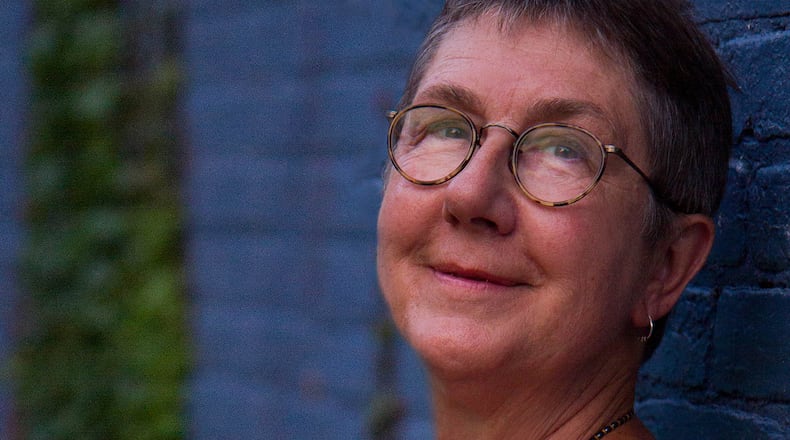Reichert was 76 and had battled a rare form of terminal cancer for four and a half years.
For 50 years, Reichert, along with longtime collaborators Steven Bognar and Jim Klein, illuminated humanity, particularly America’s working-class, across compelling themes of feminism, family, politics and economics. In recent years, she continued her life’s passion, making three films, including the Academy Award-winning documentary, “American Factory,” Lela Klein said.
“We are all feeling really proud of her legacy and her storytelling and her voice. She was a beautiful person, wonderful mom and a great grandma to my kids,” Klein said.
A longtime resident of Yellow Springs, Reichert received her first Academy Award nomination in 1977 with Jim Klein and Miles Mogulescu for “Union Maids.” She was nominated again with Klein in 1984 for “Seeing Red: Stories of American Communists.” Partnering with Bognar, she received an Academy Award nomination in 2010 for “The Last Truck: Closing of a GM Plant.” She ultimately won the Oscar in 2020 with Bognar for “American Factory.” She also shared two Emmys with Bognar for “A Lion in the House” (2006) and “American Factory,” which focused on the Chinese-owned Fuyao Glass America windshield plant that opened in the former General Motors factory in Moraine.
Additional credits include ”Sparkle” (2012), “Making Morning Star” (2015) and “9 to 5: The Story of a Movement” (2020). Most recently she and Bognar profiled the career of comedian Dave Chappelle in “8:46″ (2020) and “Dave Chappelle: Live in Real Life” (2021).
“Growing Up Female,” Reichert and Klein’s groundbreaking 1971 documentary showcasing how girls and women are socialized, was selected in 2011 by the Library of Congress for the National Film Registry of historically significant films. The film served as Reichert’s senior project at Antioch College.
Klein, who was Reichert’s first husband, said the two of them met in an Antioch film class and were involved in the anti-war and women’s liberation movements.
“It was really all about finding a medium to find voice to get out what we thought were critical and newly felt and important social consciousness, and ideas and ways of changing the world,” said Klein of Yellow Springs. “We were very much in the business of wanting to change the world.”
He said the two of them felt it was important to use the voices of everyday people to tell stories.
“That experience, I’ve just been realizing this last week, was really the seminal experience of my life,” said Klein, who continues working as a filmmaker and editor. “Her biggest legacy is how many people she inspired and trained and worked with.”
Stuart McDowell, Wright State University professor emeritus of motion pictures, was chairman of the formerdepartment of theater, dance and motion pictures when Reichert was a professor of film production.
“She had one of the great lives of our era and one of the most impactful ones of anyone I’ve every known,” McDowell said.
“She was a lovely person who was a dynamic force who changed the lives of so many people by telling local stories,” he said. “She had astonishing film technique. She was both present when she was interviewing these people and not present because she let the story be told by the people she was interviewing.”
In 2019 the Wexner Center for the Arts at The Ohio State University curated and organized “Julia Reichert: 50 Years in Film,” a traveling celebration of the filmmaker’s decades of work which premiered at New York’s Museum of Modern Art. The retrospective traveled to Los Angeles, Houston, Minneapolis, Portland, Cleveland and Louisville among other cities before the COVID-19 shutdowns.
“Reichert has personally captured more than four decades of human experience, fostering new perspectives on such era-defining movements as feminism, communism and globalization by showing us their impact on the most intimate scale,” noted Johanna Burton, former director of the Wexner Center for the Arts. “Through her attentive, ever-empathetic lens, we see how these broad cultural forces shape people who we soon recognize have much in common with our own colleagues and neighbors, family and friends. It’s hard to imagine an artist whose practice could underscore more clearly the ability of contemporary art to open our eyes to the world around us.”
In November 2021, “Julia Reichert: 50 Years in Film” received its local premiere at The Neon in downtown Dayton. Jonathan McNeal, manager of The Neon, was one of Reichert’s film students. He fondly recalls her introduction on the first day of his junior year in which she shared her fundamental belief as an artist.
“Julia looked around the room and said she saw our shoes, our haircuts, and said we were all Midwestern and needed to realize that was the truth of the matter,” McNeal recalled. “Julia said we weren’t going to be able to tell good stories until we realized we could tell the truth. Documentaries are about telling the truth and there’s something about seeking out the truth and telling other people’s stories. She’s always been interested in seeking out interesting stories about the human condition.”
“Julia Reichert was always more than a professor,” added Academy Award-winning production designer Hannah Beachler, a Centerville High School and Wright State University graduate. “She is forever a champion. A champion of women, a champion of the medium of film, a champion of her students. She put her whole soul into mentoring generations of filmmakers. She was not just interested in our grades – she was interested in us. We were all her children. She was interested in what we had to say and taught us how to put that on celluloid.”
Beachler said Reichert ”showed us that no matter where we come from, no matter that small town, we have a voice. We have a purpose and to turn the purpose into something that matters, which was illustrated in her own work.”
She called Reichert a storyteller who taught her students how to tell their stories.
“She is an Oscar nominee many times over and an Oscar winner. But those things were always just the icing on the cake for Julia. She always returned to her beloved family and home in Ohio. She has left a legacy, and she will never be forgotten,” Beachler said. “I owe my career to so many but first I owe it to her, for taking this Ohio girl under her wing and always letting me know that life and love and family are the path to all the things we love.”
Reichert was one of Wright State’s most important and influential teachers, said Joe Deer, artistic director of Wright State Theatre in the School of Fine and Performing Arts. “What makes her such an impactful educator and mentor is that she’s spent her life telling the stories of everyday, overlooked people with compassion and real appreciation for their dreams and struggles. And many of those stories are told in our own backyard – hospitals in Cincinnati, workers in Dayton, her neighbors in Yellow Springs.”
Reichert grew up in Bordentown Township, New Jersey and was a 1964 graduate of Bordentown Regional High School. She graduated from Antioch College in 1970 with a degree in documentary arts. In addition to serving as professor emeritus of film production at Wright State, she co-founded New Day Films and Indie Caucus, an advocacy group ensuring the sustainability of documentaries on PBS. She also won the International Documentary Association’s Career Achievement Award in 2018.
“It’s not hyperbole to call Julia the godmother of independent film in central Ohio, if not the entire state,” noted David Filipi, director of film/video for the Wexner Center for the Arts. “And, perhaps just as importantly, (she) taught more than a generation of filmmaking students how to make a film and how to navigate the obstacles to getting it out into the world during her career as a professor at Wright State University.”
Local WYSO radio host Jim Carter said he knew Reichert for about 50 years, dating back to their anti-war activism.
He said he thought of her as he watched “Sparkle,” her documentary about Sheri “Sparkle” Williams of the Dayton Contemporary Dance Company.
“I think that summed up how Julie approached her work as well,” Carter said. “She was like a dancer with film, extremely talented and extremely hard working and dedicated.”
Arrangements are pending.
Reichert’s survivors include her husband Steve Bognar of Yellow Springs; daughter Lela Klein, her husband Robert Holt and their children Beau Kleinholt, 12, and Dorothy Kleinholt, 8; brothers Joseph, Lou and Craig Reichert; nephew and “American Factory” co-producer Jeff Reichert, his partner Asha Phelps and their daughter Daevi Phelps-Reichert; niece Annie Reichert, her husband Saba Afshar and their son Bayan Reichert-Afshar; brother-in-law John Bognar, his wife Jennifer Bognar and their daughter Lola Bognar; mother-in-law Andree Bognar; and her first husband, Jim Klein.
Follow @LynnHulseyDDN on Twitter and Facebook



